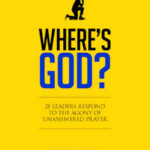We run our website the way we wished the whole internet worked: we provide high quality original content with no ads. We are funded solely by your direct support. Please consider supporting this project.
If God Can’t Control, How Can I Trust Him?
Question: If God can’t always answer our prayers for healing, for example (and I completely understand why—free will etc), then HOW can he promise to bring good out of the bad things that happen? Surely he is powerless to do that too? And if he can bring good why can’t he therefore heal in the same way?
I am overcome with fear. We now have 5 children and I am desperate to be able to trust God for their lives; to know his love; to understand Him. I would be so grateful for some help with this.
Answer: I understand your fears. I hope I can say something that will assuage them somewhat.
First, it seems to me that if all is ordained by God, then you should be asking “what good can our prayers do?” For if all happens according to God’s will, then your two tragic miscarriages as well as every child kidnapping and murder throughout history has been ordained by God, as has all your fear over about your children’s safety. Since righteous people have had nightmarish things happen to them as much as unrighteous people, there is no security in the blueprint worldview, I don’t care how much you love Jesus!
Prayer can only make a difference if God is not pulling all the strings. Of course, this means that God works in the world in an influential rather than a coercive way. And that means there is no guarantee that what you pray for will come to pass. However, if you are honest with yourself, you already know that, being that every child of godly parents who has ever died obviously had prayer that the death wouldn’t happen. At least in the warfare worldview, you know that God is on your side working for good.
God can promise to bring good out of evil, even though he doesn’t control all that happens. Here you just have to trust his intelligence. If God is infinitely intelligent, then he can anticipate every future possibility as perfectly as he could a future certainty. So he can have a plan in place to bring good out of it, in case it comes to pass. Think of God as an infinitely intelligent chess player. If you’re playing him, he doesn’t control what you do, or even foreknow what you’ll do. But he can anticipate every possible move you could make from the beginning of the game. So whatever move you make, he’s been looking at that very move as though you had to make it, and he’s been preparing a response to it in case you made it. So whatever move you make, it will only further his plan to checkmate you. Only a God of limited intelligence would need to control you or foreknow your every move in order to assure he can bring the “good” (of defeating you) out of whatever move you might make.
So whatever happens to you, God can bring good out of it. It’s just that he does this out of his intelligence, not his power. He doesn’t need to control all that happens to you to bring good of all that happens to you.
By contrast, if God is controlling all things, then you need to worry about God bringing good out of whatever evil happens to you. Because if he is capable of ordaining evil for you, then there’s no guarantee that he hasn’t ordained that that evil is permanent. (If everything happens according to God’s will, then even people going to hell is part of his will).
Finally, I’ll just say this. While I can’t promise you that further tragedy won’t enter your life, the truth is, no one can guarantee you this. The good news of the Gospel is not that tragedy won’t come our way, but that God wins in the end, and it will all be more than worth it. Can you find your security and peace in this fact… trusting that God will win, and that the end state will render all our sorrows in this present world insignificant?
THAT is a peace that passes all understanding, and it’s available to all believers NOW.
I hope you can anchor your soul in this. Living without it is hell!!
Lord bless you, and give you his perfect peace.
For more on this topic, check out Is God to Blame?
Category: Q&A
Tags: Open Theism, Prayer, Problem of Evil
Topics: Open Theism, Providence, Predestination and Free Will
Related Reading

A Calvinist Take on the Problem of Evil
Carnie Lewis via Compfight Here’s a Calvinist view on the problem(s) of evil in the wake of the Sandy Hook shootings. It’s the old God-as-author analogy. In essence, this is how Calvinism views God’s role in any instance of radical evil (quoted from the Desiring God article): But, of course, the Bible says more than…

Divine Wisdom
Why doesn’t God end it all and stop the slaughter? Why does God allow suffering and evil to go on so long? Here, Greg offers two possible answers to these questions. Option A is that all evil somehow is designed by God and somehow brings glory to him. But Greg thinks Option B is a better explanation, and it involves…

Greg on the Open View: Video One
By popular demand, we’re sharing the first of Greg’s video presentations on the Open View of the future. If you enjoy it, you can find the rest of the series entitled A Flexible Sovereignty: A Biblical Understanding of Providence and the Nature of the Future by clicking here. This video was recorded in 2008 at Azuza…

Neo-Molinism and the Infinite Intelligence of God
Classical Molinism holds that, since God is omniscient and knows all truths, he knows not only what every agent will do in the future, but also what every agent would have done in every other “possible world.” In this essay I argue that classical Molinism overlooked a whole category of truths that an omniscient God…

Why the 35W Bridge Collapsed – blog post 8/09/2007
As all of you know, I’m sure, a little over a week ago the 35W bridge in Minneapolis collapsed. This is the most traveled bridge in Minnesota. It was a tragedy, though the fact that only 13 people died and/or are presumed dead is really amazing, especially given that this happened at the peak of…

When Prayers Go Unanswered
Recently Frank Viola published a free e-book where 21 Christian leaders responded to the following question: Why is it that God doesn’t often answer the desperate prayers of His people for deliverance, protection, healing, etc.? You can download the free ebook by clicking here. The following excerpt is Greg’s contribution to this book: _____________________ Two very ill children are…

